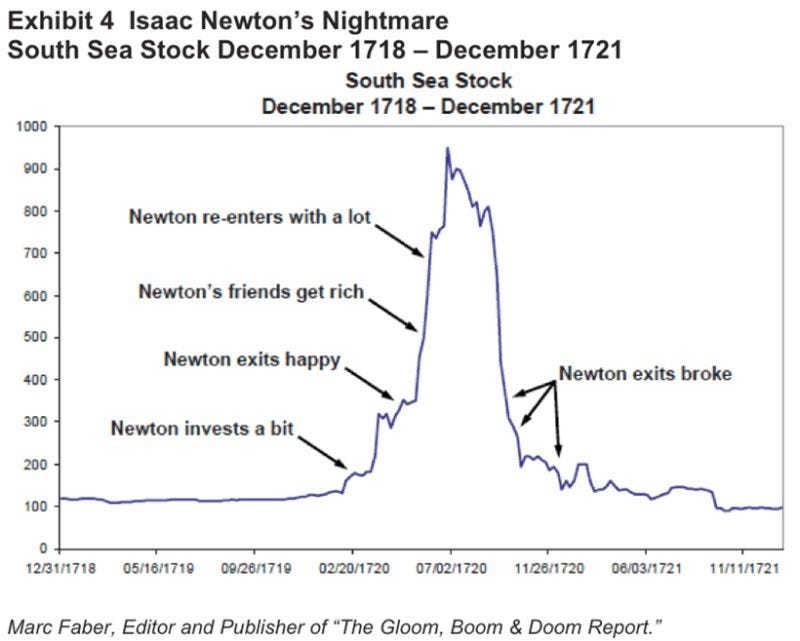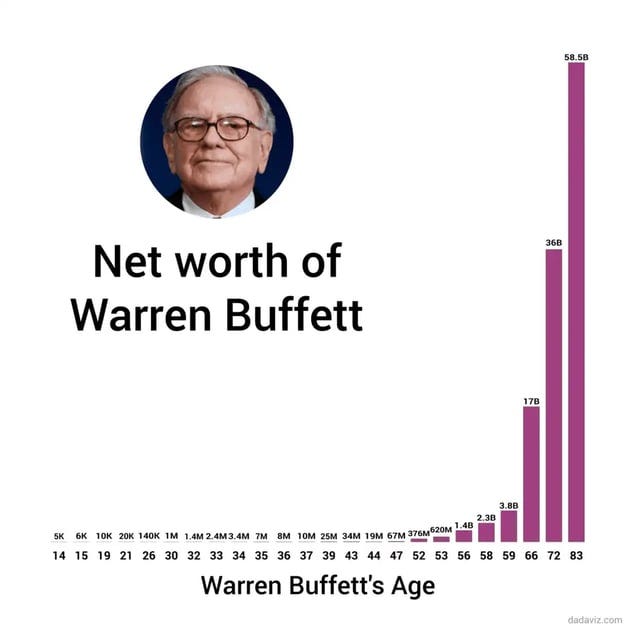Life is a War of Attrition, Only Those Who Laugh Last Win
Author: BowTied Bull
Translated by: Baihua Blockchain

Throughout history, these striking booms and busts are nothing new. The only difference now is that we have the internet, and these events can be discovered and amplified within seconds. Some people have assets exceeding $30 million, only to end up with nothing. Do you know who else has stumbled? Isaac Newton—during the infamous South Sea Bubble.
The Game of Attrition—Avoiding Zero
We can apply this principle to everything. People start giving up by the age of 25, indulging in cheap alcohol and spirits in bars. They put in a maximum of three months of effort when starting a business, then settle for an annual raise that barely keeps up with inflation. This even applies to dating. Most men either go with the flow or refuse to look abroad for their ideal type (often a charming foreigner).
In short, life is not a sprint. While you may experience significant leaps, the foundation is built during those seemingly stable months or even years. This is a long and brutal war of attrition (think of those boring games in the TV show "Survivor," where all you have to do is stand on a pole without moving). It’s a test of who can remain standing while others exhaust themselves, drop out, or self-destruct.
What’s different about this game compared to those TV shows? You never have to go to zero. You might experience a bad year, month, or quarter. But that’s okay. As long as you never go to zero, there will be no financial reset.
Every game worth playing (business, investment, fitness, relationships, etc.) has an unwritten rule. The winner is not the fastest or strongest person in a given year, but the one who survives in a constantly changing environment over ten years.
Recent Collapse Events
There are many such stories. How many of you have forgotten the following events: 1) Sam Bankman-Fried—a thirty-year-old billionaire running one of the most profitable trading platforms at the time. He went bankrupt and ended up in prison due to greed and misappropriation of client funds. 2) Do Kwon—who absurdly claimed, “Stay calm, guys, I’m putting in more money,” while actually doubling down on his Ponzi scheme, ultimately going to zero. 3) Long-Term Capital Management—a fund literally established by Nobel laureates. Made an over-leveraged bet at the wrong time? Goodbye.
Even Isaac Newton lost his mind during the South Sea Bubble. After selling early for a profit, he re-entered out of jealousy (at the peak). He lamented, “I can calculate the motions of heavenly bodies… but not the madness of people.”

This is a lesson that has repeated for centuries. The same plot, technology changes, but the outcome remains the same: greed, leverage, and the inability to stay in the game.
The smartest people in the world have also fallen into their complex models, forgetting that it is emotional humans, not numbers, that drive the market.
War of Attrition is the Core Strategy: This game rewards those who can overcome their psychological weaknesses. Buffett has been mocked for decades as “boring.” He performs poorly during frenzies, always buying what no one wants. Yet, he still stands tall today. His empire can compound continuously because he has one rule: don’t lose money. While we would never consult him on any technical issues, conceptually, his strategy is sound. All you have to do is stay in the game and refuse to sell at a loss (this requires deep research, “diamond hands” resolve, and zero leverage—because just the interest can lead to losses).
Jeff Bezos did the same. He raised $1 million by selling less than 20% of the company. He could have sold more, but he wanted to maintain control—stay in the game. This proved to be his wisest decision. After experiencing the burst of the internet bubble and years of intense board meetings, he maintained firm control. By trading greed for endurance, he ultimately created an empire worth over a trillion dollars (Amazon).
Elon Musk has also gone through all of this. He is not the best example, as he could have gone bankrupt. However, he remains an excellent example of survival. After PayPal, he poured nearly all his wealth into Tesla and SpaceX, coming close to bankruptcy. He borrowed money from friends to pay rent but never gave up. He fought to survive, not to appear successful.
Apple is also a (surprising) example. In the 1990s, it faced bankruptcy risks. Most companies would have collapsed, but Apple did not. They cut costs, rebuilt the business, and patiently waited. A few years later, the iPod was released, followed by the iPhone, and the compounding phase began. This is another trillion-dollar lesson in resilience.
In short, before you decide to use leverage, think carefully about all these examples. Can you survive a real recession? -50% to -60% declines? Losing your job at the same time? Plus an emergency expense? It’s much easier to make model predictions with rose-colored glasses.
Never Make an Investment You’ll Regret
Any investment you have thoroughly researched and firmly believe in should be held forever. For example, 20-30 years. This doesn’t mean you should hold all of it, but you should always keep a portion. If you buy Bitcoin at $100 and then sell all of it at $200, you will never be able to face yourself again. We know many such people. Some bought Ethereum at $80 and sold all of it at $200, only to watch it rise to over $4,000, while their S&P 500 index lagged by over 1,000% during that time.
In summary, for any well-researched investment, you can sell a portion. But make sure to keep some in case you sell too early.
Actively Choosing to Go to Zero is Meaningless
Most people are not crushed by leverage; they crush themselves.
They sell after a stock or token rises tenfold, feeling proud of “locking in profits.” They sell their startup for millions to gain peace of mind, only to watch it later go public, valued at hundreds of millions or even billions (Victoria’s Secret is a famous example). They give up careers, relationships, or ideas before the curve starts to bend upward. The turning point of the curve is where all the gains are! (Reminder: progress is non-linear, and this applies to stocks, tokens, and any small business).
To avoid this, you need to build your life in a way that can absorb losses and retain some high-risk positions that have already risen. Keep your expenses low, maintain enough liquidity to make big bets without desperation. Hold onto your skills and equity. These two assets will compound continuously until the turning point of the curve appears.
You must endure the boredom before breakthroughs arrive, accepting that you may seem wrong for years. Successful people are not those with the best strategies… but those who persist long enough, until the strategy starts to work.

Every major success story is a case study in painful endurance and faith. Compounding only works for a few who can remain solvent long enough to experience it. This is the ticket to entering the top 1%.
Most people cannot endure being undervalued or delayed gratification. They need recognition and attention, so they cash out to satisfy their self-esteem.
They need comfort, so they give up future possibilities. They mistake busyness for progress and others’ recognition for security. They voluntarily exit before the game turns in their favor. Ironically, focusing on survival and adaptability itself creates inevitable success.
If you stay in the arena long enough, the odds will eventually tilt in your favor. The longer you can endure pain, boredom, and anonymity, the more opportunities you have to encounter favorable “tail events.” Life cannot stop someone who refuses to leave.
If you are in that seemingly stagnant “grind” phase, remember, it’s entirely psychological. If you are making the right choices, momentum is quietly building. You should not expect immediate returns; you should focus on survival.
For every month you stay solvent, for every year you hold your ground, your chances of breakthrough increase. This is the math of attrition.
People Hate Cockroaches, But They Teach Us a Valuable Lesson: Find a Way to Survive

The more you crave results today, the less you get. That’s how Lady Luck operates. The skill you truly want is “persistence.” Stay at the table long enough, and Lady Luck will eventually think, “Hmm, this guy really doesn’t care, so I’ll give him this can of gold.”
Don’t let yourself collapse. Don’t cash out too early from investments with asymmetric return potential. Don’t sell your future for comfort. Keep your expenses low, your ego smaller, and your (funding) runway longer. Because life rewards not the smartest players—but the one who can last until the final table.
Think of it as playing poker. Your goal is to reach the final table, not to be the center of attention on the first day.
Live long enough, and leave the rest to statistics.
The Last Point About Survival—Even If You Mess Up
If you need some real-world examples of bouncing back, here are a few names you’ll recognize today:
Disney: In 1923, Disney's “Laugh-O-Gram Films” went bankrupt due to unpaid bills from distributors. He moved to Hollywood, created Mickey Mouse and Snow White, and built an empire.
Ford: Before founding Ford Motor Company, he went bankrupt twice. His first company (Detroit Automobile Company) failed due to overpriced products and inefficiency. Later, he created mass production, changing the manufacturing industry.
Jobs: Fired from Apple in 1985, he fully invested in NeXT and Pixar, coming close to financial collapse. Apple eventually acquired NeXT in 1997, allowing Jobs to return… and bring the iMac, iPod, and iPhone.
George Foreman: The famous boxer went bankrupt in the late 1970s but returned to the ring at 38. After earning enough money, he created the George Foreman Grill, making him hundreds of millions.
Milton Hershey: Before founding Hershey Chocolate, he had two failed candy businesses. Even the most well-known brands had founders who failed multiple times, but they just kept trying.
There are thousands of stories we know and millions we don’t. The principle is the same. Learn from others’ mistakes. Don’t go to zero, don’t sell 100% of your firmly believed investments, don’t use leverage.
In rare cases, if you really mess up… well, others have come back from worse situations. Just considering the excess returns from technology, cryptocurrency, and niche internet businesses by 2025 makes it meaningless to put yourself in that position.
However, this is just a cartoonish perspective.
Article link: https://www.hellobtc.com/kp/du/10/6078.html
Source: https://bowtiedbull.io/p/getting-rich-is-a-game-of-attrition
免责声明:本文章仅代表作者个人观点,不代表本平台的立场和观点。本文章仅供信息分享,不构成对任何人的任何投资建议。用户与作者之间的任何争议,与本平台无关。如网页中刊载的文章或图片涉及侵权,请提供相关的权利证明和身份证明发送邮件到support@aicoin.com,本平台相关工作人员将会进行核查。




